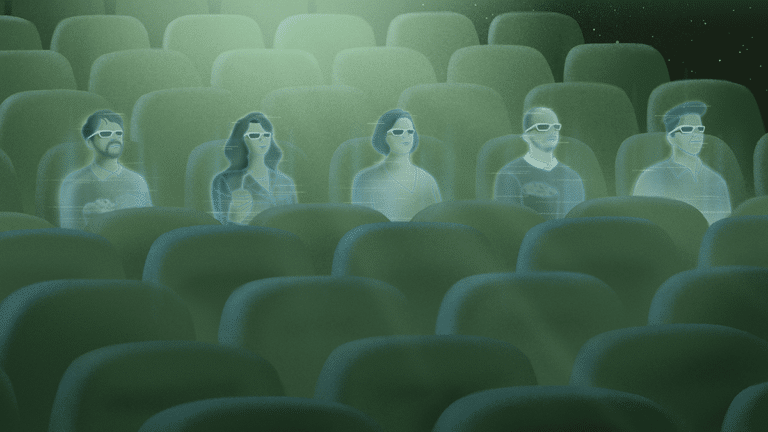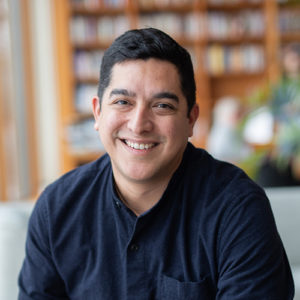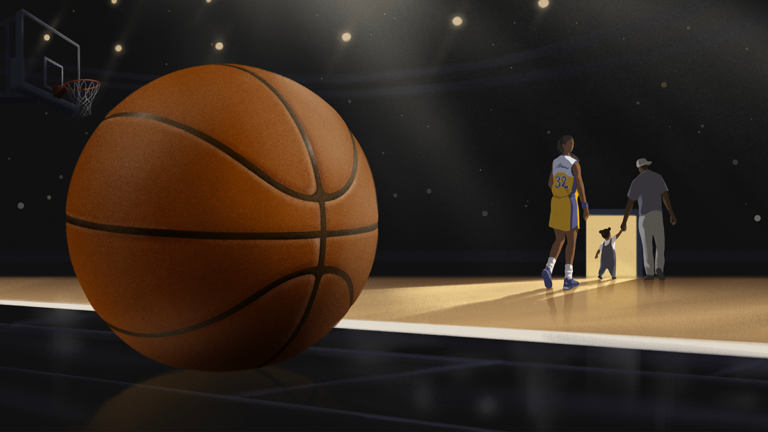Bonus: Farewell From the TMCM Team
For this special bonus episode, we gathered everyone on the This Movie Changed Me team to talk about the role movies have played in our lives, and what we’ve learned from working on this podcast. We’re grateful to all the listeners and guests who have joined us across three seasons of this podcast and have shared their own stories of transformation through movies. Thank you, movie friends!

Left to right: Gautam Srikishan, Lilian Vo, Lily Percy, Chris Heagle, Eddie Gonzalez Image by Grace J. Kim, © All Rights Reserved.
Guests

Eddie Gonzalez is director of engagement at The On Being Project and is a journalist, teacher, and chaplain interested in story and its role in individual and social healing. He was born in Corpus Christi, Texas, and now lives and works in Queens, New York.

Chris Heagle is a producer and technical director for On Being Studios. He has long been a passionate listener and creator in the space where story and music combine to help us understand and embrace our shared humanity. When he’s not in front of a screen, he is learning about the world through his two teenage kids.

Liliana Maria (Lily) Percy Ruíz is executive producer of On Being Studios and the host of This Movie Changed Me. She was born in Cali, Colombia, and immigrated to Miami with her family at the age of four. She proudly serves on the board of Centro Tyrone Guzman, the oldest and largest multi-service Latine organization in Minneapolis.

Gautam Srikishan is a producer for On Being Studios, a composer, and a lover of all things creative. He was born in the United Arab Emirates, raised in Illinois, and now calls Queens, New York his home. He’s a proud first-generation Indian-American immigrant.

Lilian Vo is an art director at The On Being Project. She thrives at the intersection of community building and collaborative design. With academic roots in international studies and anthropology, she seeks out projects that challenge and explore how to deepen human connection within and across communities.
Transcript
Lily Percy, host: Hello, fellow movie friends. I’m Lily Percy, and welcome to a very special bonus episode of This Movie Changed Me, where you get to meet the producers and designers — the whole team behind this podcast. You’ll hear from our art director, Lilian Vo, our director of engagement, Eddie Gonzalez, and our audio producers, Gautam Srikishan and Chris Heagle.
We wanted to get together as a way to say goodbye to This Movie Changed Me, and to offer all of you a chance to hear about the roles that movies play in our lives and what we’ve learned from working on this podcast.
[music: “The End” by The Doors]
One of the things that I’m really curious to know is what movie changed all of you. It might be surprising to you folks listening, but I’ve actually never asked any of the people that I work with [laughs] what movie changed them, so this is really cool for me. I’m curious, Lil, if you want to start.
Vo: [laughs] I feel like I’ve been promoting this film since I joined On Being. But my favorite movie, and the movie that changed me, is The Secret Life of Walter Mitty. And also, I’ve been preparing to talk about this, and I was scared you were gonna ask me when was the first time I ever watched it, because I cannot remember the first time I watched it.
Percy: Let me take you back in time. Close your eyes.
Vo: I tried this exercise. I did your meditation, I listened to your audio of saying that, and I still couldn’t figure out when the first time I watched it.
Percy: I think that happens often, with movies that are just such a part of your life — you can’t even really remember it.
Vo: It’s just so embedded in who I am.
Percy: So tell me why you chose Walter Mitty. What is it about that movie that really changed you?
Vo: I think it’s really this film that made me look beyond where I’m from and where I grew up, and just seeing the world is so much bigger than me, and that if I stayed still, I’ll never grow and change my perspective. But the movie pretty much changed me because it kind of gave me this push to go out of state for college and just to be more curious. And then it just also changed my perspective on art. One of the quotes from the movie that stuck with me is — I think it’s like, “the most beautiful things don’t ask for attention.”
Percy: That’s beautiful.
Vo: And so it just made me sit; being curious, not being the loudest voice in the room, listening to others — oh, I just bawl every time I watch it. When there’s this scene of Walter running from his office to the airport, it’s like that moment when you’re like, “I’m gonna do something.” That’s what I feel like when something big is about to happen.
Percy: Isn’t that amazing? So you go to that image in your head when you feel like something big’s gonna happen.
Vo: And then that song.
[music: “Step Out” by José González]
You know the song, the “Step Out” song? It’s like climbing a mountain, in audio form.
Percy: [laughs] Like you can do anything. Well, I will say, knowing you has given me a whole new appreciation of that movie. And I’m grateful for that movie because it brought you to Minnesota, because you grew up in Seattle, and you wouldn’t have come to school in Minnesota unless you’d seen this movie.
Vo: I had a huge pressure from family to go to my state university. Nine out of the ten schools I applied to were out of state, and my parents didn’t know about it. And so I think this movie gave me the courage to build a life outside of what people were expecting of me. And I almost had to put a front. It almost felt like everyone thought it was natural for me to do this, but it was actually really scary, and I was so scared of failing. But then watching the movie, or just remembering the movie, I just remembered that it’s not about the destination; it’s about the journey. It just made me so excited for future me.
Percy: I love that. That’s so beautiful.
Vo: I could literally talk about it for an hour, so I won’t — I won’t take over this whole interview. [laughs]
Percy: [laughs] Well, folks can write you and let you know if they also want to talk about Walter Mitty for an hour.
Eddie, what about you? What movie would you say has changed you?
Gonzalez: This is a hard question. I feel like every time we’ve done one of these, I’ve thought to myself, what movie would I choose? And I kind of thought I was just gonna say, E.T. I love that movie so much.
Percy: I love that.
Srikishan: So good.
Gonzalez: And I think it was one of the first movies, when I was growing up, that I got a real sense of just the magic that can be in a movie and how moving they can be. So it was actually the first movie I ever cried to. And I’ll never forget having the reaction of watching a movie and, towards the end of it, starting to cry and [laughs] having a simultaneous reaction where I was like, moved so much by the story, but also really freaked out that I was crying and having these real strong emotions in reaction to what I knew was just something on a screen.
Percy: Have you watched it as an adult?
Gonzalez: It’s been a long time. I haven’t.
Percy: One of the magical things about that movie, which I think is so key to just the brilliance of Steven Spielberg, is it’s still just as emotional, watching it as an adult, because he put himself in the shoes of these children. And so you feel like you’re transported back in time to what it was like to be a child and be confused by everything around you and all of the things you don’t understand — and, especially, all the adult things that feel really hard.
Gonzalez: Wow. Now I want to go back and watch it. But I think it says something to me, when you say this, that I was watching it probably right around the same — I was probably right around the same age as Elliott. And the fact that I was having an emotional reaction to what was happening on the screen just goes to show how much he did — Steven Spielberg did put himself in the shoes of these children that I could feel my own — that my feelings were resonating so much with what I saw Elliott going through and what I saw about love and family and friendship. And we do our best to do what we know is right, even though there are all these pressures telling us that something’s wrong — which, as a queer boy, now [laughs] that speaks to me in a completely different way. But that idea of caring deeply, even when it means saying goodbye when you don’t want to — I don’t know; I love it.
Percy: It’s so powerful.
Vo: OK, y’all just changed my mind. I actually was too scared to watch E.T. So [laughs] I didn’t realize it was like — so yeah, it’s on my list now.
Srikishan: It’s so good.
Percy: It’s so beautiful. It is really emotional.
Gonzalez: It is.
Percy: It’s really emotional.
Gautam, what about you? What movie would you say has changed you?
Srikishan: Well, I’m also gonna go back to childhood to draw on this. But I think it was a similar experience for me, of maybe being the first time — at least that I can remember, crying to a movie. But the movie for me is Fox and the Hound.
Percy: Oh, that’s such a great one.
Srikishan: Yeah, the old animated classic. I feel like Fox and the Hound, for me, was so special because it’s so — I don’t know; I latched onto some very bittersweet quality to it, I guess, when I was young. I must’ve been a really emo kid, [laughs] is what I’m realizing.
[laughter]
Percy: [laughs] As you tell the story.
Srikishan: Yeah, I’m like, oh gosh, that sounds like me. I couldn’t put language like this to it, when I was watching it as a kid, but I just remember watching it over and over and over again. I must’ve watched it like 20 times.
I think the thing that really grabbed me was just that — again, I couldn’t put these words to it when I was kid, but I think I was maybe latching onto some deeper truth in it, which is that sometimes relationships can be incredibly precious to you and still be broken, or can still be — you may still need to cut someone out of your life or put up boundaries, change the nature of that relationship.
Obviously, in this case it’s two friends who are dealing with these irreconcilable differences — literally, in who they are, because one of them is a dog that’s for hunting and one of them is a fox that’s for being hunted. And it’s just so [laughs] upsettingly relevant to the times we live in right now and that I think everyone probably can relate to feeling like someone they love is sort of on the other side of that barrier. And I don’t know exactly why, but something about that really, really resonated for me when I was young.
Percy: So much of movies and the impact they have on us has to do with when we see them. And that’s such a key thing, too, that I love about movies. And that’s one of the reasons why I always ask that question of, “how has a movie changed for you, and how have you grown together,” because it’s really true. If you continue to watch a movie, and it’s a good movie — meaning it’s one that has a great story and great visuals — it will meet you wherever you’re at. It’ll just be there to help you.
Chris, what would you say? I actually have no clue what you’re gonna say.
Heagle: Well, I think that I’ve mentioned this to you before.
Percy: Have you?
Heagle: Yeah. So for me, the “when” I saw it was the key ingredient. So my movie — and everyone, I’m sure, would’ve thought, “Chris’s movie is definitely gonna be a rom-com.”
[laughter]
Srikishan: [laughs] I would’ve.
Heagle: But it is; so for me, it’s Sliding Doors, which I don’t know if anyone besides Liliana Maria has even seen it.
Srikishan: Nope.
Percy: We have talked about this. But I didn’t realize it was a movie that changed you in that way.
Heagle: So it’s on YouTube, by the way, y’all, so you can just watch the whole thing on YouTube. Essentially, it’s a thought experiment of Gwyneth Paltrow’s character — and by the way, I would argue that this is peak Paltrow, this movie. She plays two different characters, essentially, of herself.
Percy: Peak British accent, too. [laughs]
Heagle: Yes, very much, British accent. And so it’s literally, she gets fired from her job, and on her way out and down into the subway, she goes to get on the train, and she misses the train. And then they back up the movie like 30 seconds, and then she runs down the stairs again, and she just makes the train. And then at that point, the two plots split off. And so we see what happens to Gwyneth Paltrow who made the train and what happens to Gwyneth Paltrow who didn’t make the train. And it has to do with — she gets back just in time to find that her boyfriend is cheating on her, and if she missed the train, she doesn’t find that out, and how does her life change and diverge. And the plot weaves in and out of that story.
And so, for me, I saw this in 1998, when it came out, in the theater. At the time, I was recently divorced, I had changed jobs, and I was trying to decide, am I going to move to New York? Everything felt up in the air. And so seeing this movie at that moment was — it was both comforting in the sense that the little decisions that you make will add up to good things, and also that the decisions you make don’t necessarily define the outcome. Because what ends up happening in the movie is, her life diverges but then comes back to essentially going in the same direction that it was gonna go in the first place, which is, you know, the rom-com part. So it’s sort of just a comfort of, if you try to make the best decision in the moment, that things are gonna be OK.
Percy: And that there is no wrong decision, right? That’s it.
Heagle: Right.
Percy: It’s so funny, because I didn’t know that that would’ve been the movie you chose, even though I know that I have a very vivid memory of us working together, and we’re recording an event in Chicago, and I just asked you, “What’s your Sliding Doors moment? Do you have a Sliding Doors moment?” Not knowing you had this connection to this movie. [laughs]
Heagle: And I’m like, “That — whoa!”
Percy: [laughs] Because it has become a way of saying, what’s that moment in your life where if you went one way, you would’ve had a very different life?
Heagle: Exactly. Exactly. And I think it was also, coming off of having gone down a road of getting married to somebody that I shouldn’t have, [laughs] or wasn’t meant to be with, and finding a rebirth in that. Literally, the end of the movie, both — oh, sorry, spoiler alert.
[laughter]
Percy: I don’t think you can “spoil” a movie from 1998. I’m just saying, I think you can say that. [laughs]
Heagle: I agree with that. But, spoiler alert, big events happen to both versions of Gwyneth Paltrow at the end of the movie, and the character that looks like they’ve gone down the wrong path, or had the most bad things happen, as they’re waking up from surgery in the hospital has the memories of the other character — not specifically the person, but some of the things that happened. And she wakes up and makes the decision, for her new life, to dump the guy and move on with her life, at which point she goes out into the elevator and meets the guy from the other timeline.
Percy: Who is far better — John Hannah …
Heagle: Oh my God, John Hannah is so good in this.
Percy: … aka, the best part of Four Weddings and a Funeral.
Heagle: [laughs] Yep. For the accent alone, y’all, you gotta check it out.
Gonzalez: Added to my YouTube queue — peak Paltrow.
Srikishan: Free on YouTube.
Vo: That was a beautiful summary, and a persuasion to watch the film.
Gonzalez: Agreed.
Heagle: Oh, yeah. You gotta do it now.
Percy: You have to. So one of the really wonderful things about working on this podcast with all of you has been the ways in which, when we’re doing the editing, we all continue to learn from what the guests share and the movies that they pick. And I’m really curious what you all would say have been some of the things that you’ve learned from either the guests, one of the guests, one of the movies that we featured in the three seasons of This Movie Changed Me.
Vo: I’ve already talked about this one, but hands down, when we talked about Selena.
Percy: Shea Serrano.
Vo: Yeah, oh, Shea Serrano. I think the main theme of that interview was just about dreaming big, but I think the biggest takeaway for me was my perspective on parenting. I just remember crying, listening to the interview the first time. I remember we were in the basement of the On Being office; we were all together. And then, after we listened to it, I was like, “Y’all, I get it now.” And then y’all were like, “What?” And I was like, “I get parenting now.” [laughs] That interview just — I just had an epiphany.
Percy: [laughs] It’s so true, though, because one sentence that he says in that conversation could really replace all of the parenting books out there.
Vo: He said something like, “Our job as parents is to make mistakes. And then our kids will fix it for us.” Because I think I was just scared of parenting, because I was like, I’m gonna mess it up; my kid’s gonna be so messed up from all my flaws; I’m not perfect; I don’t know how I can be responsible for a whole other life. And I think that co-parenting perspective and just the journey together just allowed me to think about it a lot differently. So that interview stuck with me a lot.
Percy: I love that. That’s so powerful.
Heagle: I would go with Groundhog Day. And it’s not just because we’re in a global pandemic where every day feels like the same damn day.
[laughter]
But the whole idea — and I forget the name of the woman we interviewed.
Percy: Naomi Alderman.
Heagle: Thank you. And it was all this idea that Groundhog Day is a Buddhist meditation — noticing the things around you that are valuable in your day and that are positive in your day, and how you come to a situation and how you choose to show up has a lot to do with the outcomes that are gonna happen. So I love that idea that she goes around her neighborhood and tries to notice something about a building she hasn’t seen before, or takes a different path on purpose, just to give herself a different experience. So it’s something that I come around on, when I’m feeling like I’m in a rut. I’m like, “I should get out of my Groundhog Day and …”
Srikishan: I remember that interview. I think she calls it “receiving the benediction,” when she has that experience. I’m just like, yes. I want to receive the benediction in my life, regularly. [laughs]
Percy: That’s so true. I think for me — really, it sounds so cheesy to say, but I’ve learned so much from every guest. But the one that stood out to me the most is probably the guest who spoke about Toy Story. Of course, his name just completely — Father …
Heagle: Charles Pope.
Percy: Charles Pope, thank you. How can you forget Father Charles Pope? [laughs] Was listening to Father Pope, Father Charles Pope talk about Toy Story. And the reason that it left such an impact for me is because it’s exactly why I wanted to do this podcast. It’s that this is a movie that was intended for children, and yet this man got such a huge lesson out of it, which is that we all have a purpose, and no matter what the role is, how small or how big, and that even if we fail, God still has a purpose for us.
That just blew me away. And I still think about that often, not only when I watch Toy Story, which has an entirely different meaning for me now, but when I think about the limitations of my own role and my own purpose in life.
Heagle: That’s beautiful.
Gonzalez: I have a —
Heagle: I’m curious what Eddie would —
Gonzalez: Oh, go ahead, Chris.
Heagle: No, I’m curious what Eddie is choosing.
Gonzalez: Yeah, I was just — so Monica Castillo’s reflections on Coco. That, for me, was — I think because it was early on. So it was Season 2, I was still fairly new to the This Movie Changed Me team, and — well, first, Lily, you and I went to go see this movie together in New York City.
Percy: We saw it together, yes!
Gonzalez: So that was really cool. And then I had a shout-out in the episode — “Hello!” — and was really excited about that.
Percy: Because we had a conversation after we saw it, and that was something that really stood with me, because you’re Mexican-American, and you found so much of yourself in this movie.
Gonzalez: Yeah. And to hear — I think — so that conversation with Monica was really powerful for me, because she reflected on representation and how she started to tear up even as the opening credits started to go, with the mariachi music of the Disney theme song. And I remember having that same kind of reaction. And at the time, I was also really thinking about ancestry and the connections that we have to our elders; and how we remember folks; and how our lives are in some ways these testaments to their legacies, and that can be good, and it can also be really complicated.
And I just loved her exploration of memory, and how forgiveness happens across generations, and also how sometimes the dreams that we have come at a price and sometimes cause misunderstandings, but that there’s ways that we can choose how we make our way in the world and also honor the people who have come before us, and recognize that there might be misunderstandings and complications there, but there’s also some healing that can take place through being in touch with our past and having conversations with the people that are still with us. And strong women, too, which is very — something in my family; I recognize that strength in the women in my family in that conversation, also. So I needed that reminder.
Percy: I’m so glad. Gautam, I know you’re the newest member of the This Movie Changed Me team, so no pressure at all if you don’t have an episode. [laughs]
Srikishan: I’ve learned nothing, Lily. [laughs]
Percy: [laughs] Nothing.
Heagle: You were furiously listening to the back catalog last night.
Percy: [laughs] Exactly. But I’m curious if there is one.
Srikishan: There is, and from this season, too, from our final season. I would actually say The Color Purple taught me the most, for a few reasons. One is that I had not seen the movie, nor had I read the book, nor did I really know anything about it. I just knew that it was this famously landmark work of fiction from this Black writer, Alice Walker, and that’s about it. I knew it was important, and that’s it. So just watching the movie — I haven’t read the book yet, but I plan to. But just watching the movie, alone was quite a revelation. I was just like, I can’t believe this got made, [laughs] first of all —
Percy: Right? 1985.
Srikishan: Yeah. I think the other side of it is Danez’s interview. Just all of their reflections on the movie are so nuanced and so thoughtful. One of the things that I really carry with me is what they said about how the characters, I think they say, are “always and never in crisis,” and how they are simultaneously in these horrible, just awful situations and downtrodden in this way and are still finding these pockets of happiness and joy and jubilee. And I think Danez said, “the sad always finds its way to some type of joy or jubilee.” And that’s just — that feels so true, to me.
Percy: The blues note. It does.
Srikishan: And so that’s just something I’m keeping in my back pocket.
Percy: I love that. I love that. This is why this podcast was such a joy for all of us to make. The movies just taught us so much, as individuals and collectively. And we’ve heard, over the years, from all of you about how they’ve changed you. And one of the biggest joys, for me, has been receiving emails from people who had never seen the movie that we talked about and then went out and watched it and had their own transformative experience. And that has always been the sign of success, for this podcast. And so I’m really grateful to all of you for listening to the work that we’ve done and for watching those movies. And to the team here, which you can’t see but I get the luxury of seeing on Zoom — thanks to all of you for creating this, because it wouldn’t be the same without you.
Heagle: Well, thank you for saying that, Lily. You need to get your own shout-out, of course.
Gonzalez: Yeah!
Heagle: Your ability to connect with guests and your —
Percy: Let’s be clear. I can’t do it about anything but movies. [laughs] I’m like Sheldon on Big Bang Theory — [laughs] I have very limited connection points.
Heagle: Here’s another little behind-the-scenes, behind-the-curtain Easter egg: For when we’re recording the script, it’s not written down. It’s not typed out. Lily essentially improvs the opening of the show, with some guiding conversation with a producer who’s not then in the episode. That’s just Lily being Lily and loving movies and being able to express it in such a conversational and relatable way. And that, I think, has been a huge part of why this show has been so loved.
Percy: Thank you. Well, we realized early on, when we started making this, that me reading the script vs. me just thinking about what it was — [laughs] what it was that the movie meant and what the plot was, it was just better to do it that way. And so I truly mean, movies have that — they’re friends.
Is there anything else that you all want to say here, team, to our listeners as we say goodbye?
Vo: Yeah, This Movie Changed Me changed me. [laughs]
[laughter]
Percy: [laughs] Well, we can’t top that. Thanks, Lil.
Srikishan: That is a mic drop.
Gonzalez: You had that in your back pocket. That was ready to go.
Percy: The whole time. She wrote that down. She’s like, “wait for it … wait for it …”
Vo: Wait — believe it or not, I just came up with that.
Percy: Whaaat? [laughs]
[music: “Closing Time” by Semisonic]





